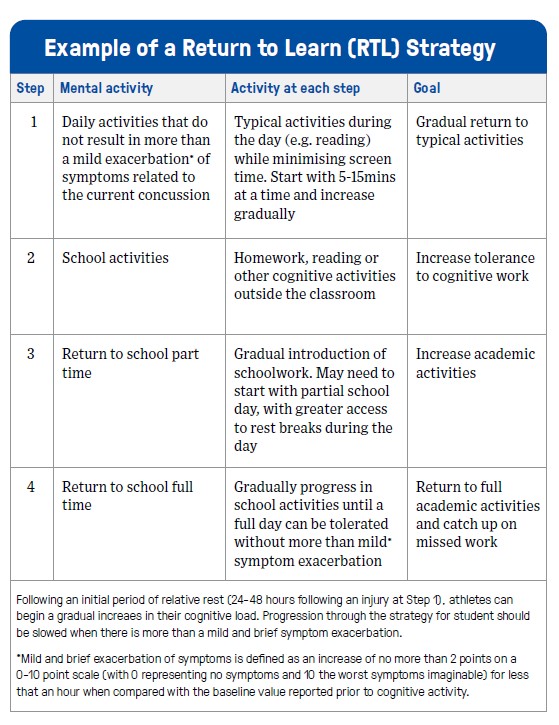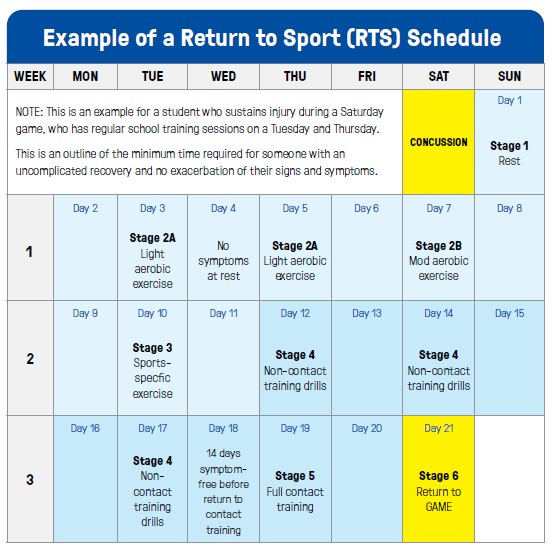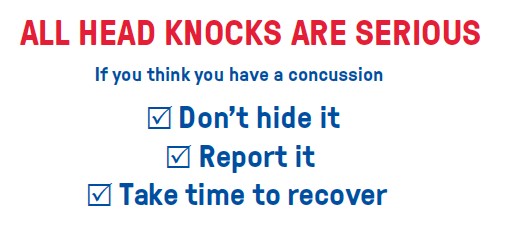All head knocks are serious
What is a concussion?
A concussion is a common injury caused by an impact to a person’s head that results in a temporary disturbance or loss of brain function. Often arising during a sporting match, concussions most frequently transpire from a collision with another player or impact with the ground. It can also happen from an impact that is not directly to the head, but an injury to the body that may transmit a force to the head, A hard knock is not always the cause, and concussion can occur also from relatively minor knocks or impact.
It is important to note that concussions are not always immediate. The symptoms do not always cause a loss of consciousness and may not present themselves until hours (or even days) after the initial impact. While all concussions should be assessed by a doctor, most will resolve without the need for specific treatment. A short period (24-48 hours) of rest, followed by a gradual return to activity, is the main treatment.
Where a loss of consciousness has occurred, an ambulance must be called immediately. All concussions are serious.
The impact of a concussion
The signs and symptoms of a concussion vary and can, at times, be difficult to detect. There are the clear signs, for example, loss of consciousness, seizure or balance difficulties, that indicate the person has sustained a significant injury. Urgent medical care in such situations is critical and should be sought immediately.
However, there are also signs or symptoms of concussion that can be quite subtle, presenting as nothing more than an ‘off-feeling’, or symptoms such as feeling ‘foggy’, lethargic, having sensitivity to light or noise, feeling dizzy or nauseous. It is therefore important that we are on alert to children and young people acting out of character or unusually, to detect whether a possible concussion has occurred.
The Australian Sports Commission has put together this helpful list of identifying symptoms:
Critical symptoms/signs
- Neck pain
- Increasing confusion, agitation or irritability
- Repeated vomiting
- Seizure or convulsion
- Weakness or tingling/burning in the arms or legs
- Deteriorating conscious state
- Severe or increasing headache
- Unusual behavioural change
- Double vision
Obvious symptoms/signs
- • Loss of consciousness
- No protective action in fall to ground directly observed or on video
- Seizure or jerky movements after a knock
- Confusion, disorientation
- Memory impairment
- Unsteady on feet or balance problems
- Athlete reports significant, new or progressive concussion symptoms
- Dazed or looking blank/vacant
- Changed behaviour – may be more irritable, agitated, anxious or emotional than normal
Subtle symptoms/signs
- Headache
- Pressure in the head
- Neck pain
- Nausea or vomiting
- Dizziness
- Blurred vision
- Balance problems
- Sensitivity to light
- Sensitivity to noise
- Feeling slowed down
- Feeling like ‘in a fog’
- Don’t feel right
- Difficulty concentrating
- Difficulty remembering
- Fatigue or low energy
- Confusion
- Drowsiness
- More emotional
- Irritability
- Sadness
- Nervous or anxious
- Trouble falling asleep (if applicable)
Most long-term effects of concussion are rare. The impacts of most concussions are temporary, with the majority of people completely recovering when managed correctly. The recovery time is typically up to 4 weeks for children and adolescents.
In about 20% of cases, however, symptoms and effects can be experienced up to 6 weeks after the injury. The more concussions experienced by an individual, the more likely the possibility of suffering long term consequences.
This is why it is so important to manage a head injury properly, and give the brain enough time to heal before returning to usual activities.
Role of the parent
To reduce the risk of short or long-term effects associated with a concussion, it is imperative that you manage your son’s injury appropriately and report it to the relevant people.
Disclosure
All head injuries should be treated as serious injuries regardless of the circumstance. Head injuries, particularly in children and adolescents, must be managed immediately and correctly to prevent any further brain trauma, complications or ongoing symptoms.
It is advised that medical evaluation be sought as soon as possible after the event, to ensure proper management and care. Even in instances where emergency care is not needed and your son is not obviously symptomatic, it is still important that you visit your doctor within one or two days of the injury for proper assessment. As mentioned earlier, some symptoms do not always present immediately or are not obviously noticeable, so it is important that your son has a proper medical evaluation to ensure his health and wellbeing.
To assist the treating medical practitioner, it is helpful to note the following details at the time of the injury:
When: what time did the injury take place?
How: how did the injury occur? For example, is the injury from a knock to the head by a cricket bat or by an opponent’s shoulder?
Where: where on the body was hit? For example, the temple, shoulder or back of the head.
What: what occurred next? Including symptoms such as loss of consciousness, convulsions, amnesia, vomiting or confusion.
Additional useful information: any further symptoms such as behavioural changes or loss of memory.
Where an injury is sustained outside of school hours, it is important that parents inform the school as soon as practically possible, but no later than the first school day after the event. This is to ensure that the relevant people at school can keep an eye out for any signs or symptoms that may develop in time, and so that adequate precautions can be taken to avoid repeat injury or so on.
Management and recovery
Immediately after medical treatment is sought and a concussion is diagnosed, the first step to recovery is usually rest. Rest should be both physical and mental, for a period of 24-48 hours, or until symptoms subside.
Once symptoms have subsided, it is good for your son to start moving again, albeit slowly and in line with your doctor’s guidance. Light physical activity is appropriate at first, with monitoring for any symptoms reappearing. After this, your son can usually resume a graduated return to regular play/sports (with the guidance of their coach and our student health officer) but avoid body contact for a period of time deemed appropriate.
Managing Concussion
If a suspected or confirmed concussion has occurred, students must take appropriate time to rest. They must immediately be withdrawn from playing or training in sport (or other physical activity) and should also take time to mentally rest. Time off school may be needed, as well as refraining from playing computer games, reading and watching television.
Children and adolescents take longer than adults to recover, so a conservative approach to recovery is advised. Young people should be completely symptom free for at least 14 days before returning to contact or collision activities.
Following a period of rest, the Australian Sports Commission recommends a graded Return to Learn and Return to Sport program.
Return to Learn
Return to Learn is about a gradual return to a student’s usual school routine. It is recommended that after a period of 24-48 hours of rest after a sustained concussion, students can return to schoolwork, provided the activities do not worsen their symptoms.
Thinking or concentrating for long periods can bring on or worsen symptoms of concussion, so gradually increasing the load on the brain without provoking symptoms is recommended. In recognising this, your son’s usual schedule may
need to be adapted or modified to include regular breaks or increased time to complete tasks.
It is also recommended that a return to school should take priority before returning to sport. Boys should not, therefore, return to sport until they have successfully returned to normal school activities.
An example of a Return to Learn strategy is as follows:

Return to Sport
Return to Sport is about the gradual return to sporting activities following a concussion. Again, it is recommended that after a requisite 24-48 hours of rest, students can begin light physical activity, provided the activity does not worsen symptoms. Once students are symptom-free, they can then begin a staged return to sport.
The framework recommended by the Australian Sporting Commission is:

So, put into practice, this might look a little like the following example schedule:

BGS Position and Process
The BGS position for action related to instances in which an injury occurs at school or during a school event/activity that may have resulted in a possible concussion is as follows:
- Any student with a suspected concussion at BGS must be withdrawn from playing and/or training immediately;
- The student must be carefully monitored for any signs of symptoms (mild – obvious) relating to concussion (refer to table);
- Refer the student for medical evaluation; and
- Ensure the student has received medical clearance, and there is a graded plan in place before allowing them to return to school, sport or physical activity at school.
The Student Health Officer will provide follow-up support and liaise with the parents on behalf of the school after a head injury that has occurred during school time or BGS sporting events.
The BGS Concussion Return to Sport guidelines are modelled on the AFL concussion policy and the AIS guidelines. Every sport played at Brighton Grammar must adhere to the BGS concussion Return to Sport requirements within this policy.
For all suspected or confirmed concussion cases in any sport, training is not permitted without full medical clearance from a medical practitioner (GP, Sports Doctor, or Neurologist). After obtaining initial medical clearance, students may participate in non-contact training if they are symptom-free but are prohibited from contact training. Following a second medical clearance on Day 14, students
can return to contact training. Students must complete at least one full training session before participating in a weekend fixture. If any symptoms persist or reoccur after 14 days, a follow-up medical clearance will be required.
BGS will always take a cautious and conservative approach to return to play (‘if in doubt, sit them out’) which will involve a graduated return and increase in activity over the following days or weeks. This will be undertaken in full consultation with the player and his parents, as well as in conjunction with medical clearance and recommendations.
APS (Associated Public Schools of Victoria) Policy
The APS (Associated Public Schools of Victoria) Policy states that the management of sport-related concussions in children (aged five to 12 years) and adolescents (aged 13 to 18 years) requires unique considerations suitable for the developing child.
Children have physical and developmental differences – less developed neck muscles, increased head to neck ratio, and brain cells and pathways that are still developing.
Children and adolescents may have greater susceptibility to concussion, they may also take longer to recover, and they may be at risk of severe consequences such as second impact syndrome. Managing concussions in children and adolescents therefore requires different standards and a more conservative approach.
Match Day Procedures
In the early stages of injury, it is often not clear whether you are dealing with a concussion or there is a more severe underlying structural head injury. For this reason, the most important steps in initial management and beyond include:
- Recognise – recognising a suspected concussion.
- Remove – removing the person from the game or activity – ‘If in doubt, sit them out’.
- Refer – referring the person (parents/guardian) to a qualified medical practitioner for assessment.
- Return – returning to either training or games.
Any player who has suffered a concussion or is suspected of having a concussion must be medically assessed as soon as possible after the injury and must NOT be allowed to return to play on the same day.
What the experts & others are saying?
The following are some comments from other various sources regarding concussions:
AFL General Counsel, Andrew Dillon:
‘The updated guidelines reflect the AFL’s ongoing commitment to the health and safety of all players at each level of the game. Concussion is a serious issue, and we will continue to
treat it as such. The updated concussion guidelines for community football represent a significant step in the AFL’s existing record of ongoing improvements to its concussion management strategy that reflect medical research and other learnings over time.’
AFL Chief Medical Officer, Peter Harcourt:
‘The focus must be on ensuring that players pass through each of the steps safely (i.e. rest, recovery and a graded return), without a recurrence of symptoms, rather than simply progressing through a schedule.
A player who shows symptoms or any signs of concussion during a match or training must be removed from the field of play and assessed and must not return to that match or training session.
The next step is that the player must be assessed by a medical professional, then move through each of the steps in the guidelines, and finally receive medical clearance prior to returning to full-contact
training.’
In general, children and adolescents (aged five-17 years) require a more conservative approach than adults because their brains are developing. As such, the priority is not just player welfare and return to sport, but a critical element is return to school and learning.
This handy graphic from HeadCheck, an evidence-based concussion app:

Resources
Parents
- RCH Kids Health Info – return to sport factsheet
- The Raising Childrens Network
- Holland Bloorview Concussion Handbook
Healthcare Professionals
- Consensus statement on concussion in sport
- What is the difference between concussion management in children as compared with adults?
Schools & Community Sporting Organisations
Other useful information can be found on the following sites:
Resources
Memory and Effective Learning
What is memory and how it affects learning
Do you want to be part of our Staff Development Network?
Sign up to receive our newsletter

